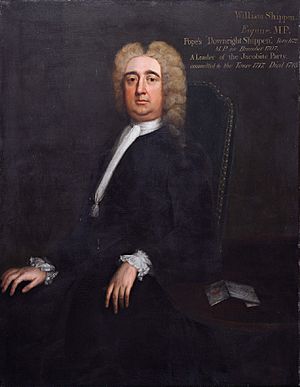William Shippen (MP) facts for kids
William Shippen (born 1673 – died 1743) was an English politician. He was a member of the Tory party and supported the Jacobite cause. This meant he believed the Stuart family should be kings of England, not the Georges who were ruling. He served in the House of Commons (part of the British Parliament) for many years, from 1707 to 1743.
Contents
Early Life and Education
William Shippen was born in 1673. He went to Stockport Grammar School when he was young. Later, he studied at two famous universities: Brasenose College, Oxford and Trinity College, Cambridge. He also studied law at the Middle Temple and became a lawyer in 1699. In 1712, he married Frances Stote.
Shippen's Political Writings
William Shippen was known for his strong opinions. He wrote poems and articles to share his political views. During the time of Queen Anne, he wrote two popular poems: Faction Display'd (1704) and Moderation Display'd (1705). These poems were satirical, meaning they used humor to criticize political groups. They were very successful and caused other politicians to write back. Years later, in 1732, he wrote a piece defending King Charles I, who had been executed long before.
Shippen's Time in Parliament
Shippen was a Member of Parliament (MP) for many years.
- From 1707 to 1713, he represented the area of Bramber in Sussex.
- In 1713, he was elected MP for Saltash in Cornwall.
- From 1715 until he died, he represented Newton in Lancashire.
Speaking Out in Parliament
William Shippen was known for speaking very strongly in Parliament. He always tried to help the Stuart family's claim to the throne.
Criticizing the King
In 1717, Shippen openly criticized King George I. He said the King's speech was more for Germany (where the King was from) than for Great Britain. He even called King George "a Stranger to our Language and Constitution." The other members of Parliament thought this was very disrespectful to the King. Because of his words, Shippen was sent to the Tower of London on December 4, 1717.
Supporting the Jacobite Cause
Even after being sent to the Tower, Shippen continued to support the Jacobite cause. He wrote to James Francis Edward Stuart, who was known as the Old Pretender and was the Stuart claimant to the throne. Shippen promised to follow all his wishes. In 1721, Shippen met with another Jacobite leader, George Lockhart, to plan how they could communicate better.
However, later on, some Jacobites felt Shippen was too cautious. In 1740, he was no longer included in their secret letters about a possible uprising.
His View on Politics
In 1741, there was a vote to remove Sir Robert Walpole from his job. Shippen chose not to vote. He famously said, "Robin [Walpole] and I are two honest men, he is for King George and I for King James." He meant that both he and Walpole were loyal to their chosen kings, but many other politicians just wanted power for themselves. He also said he wouldn't help remove Walpole based on ideas that went against having a king.
William Shippen died in 1743. He did not have any children.
 | Aurelia Browder |
 | Nannie Helen Burroughs |
 | Michelle Alexander |


